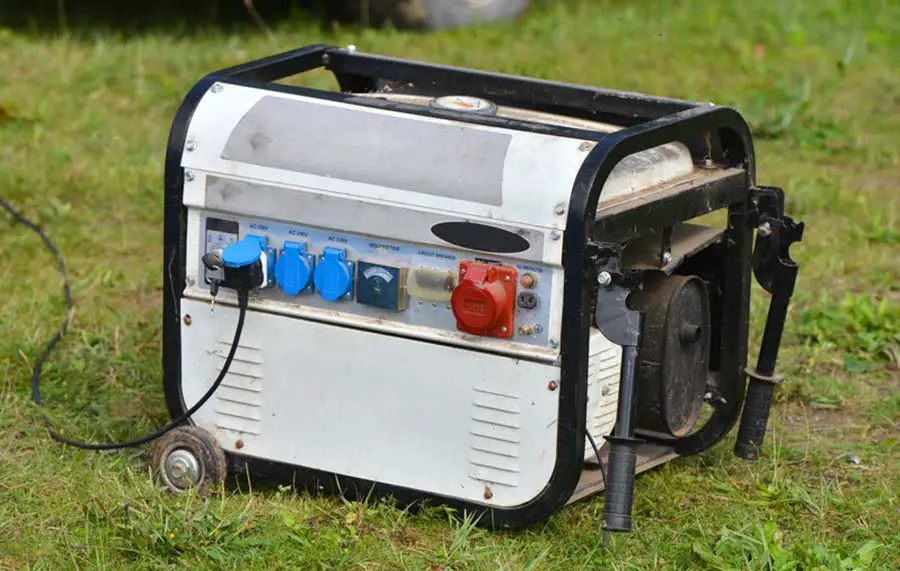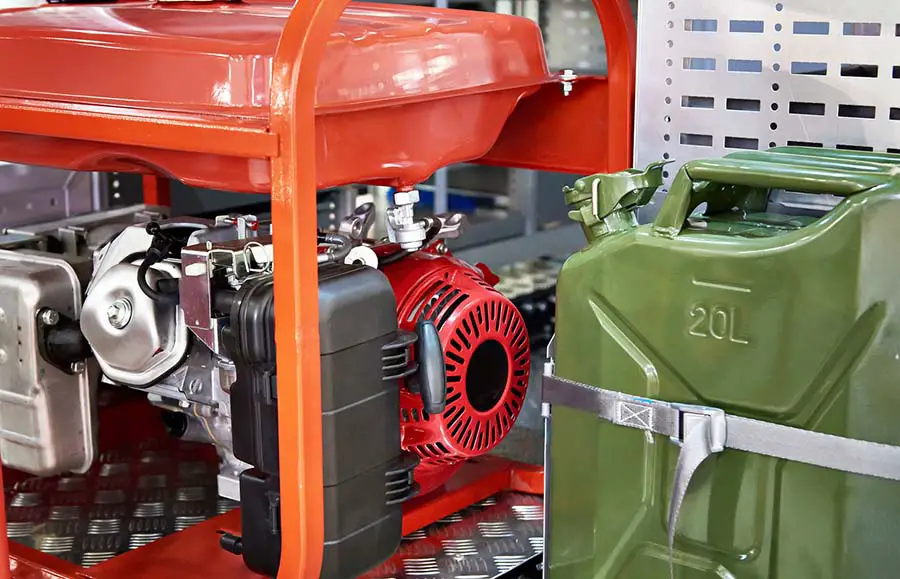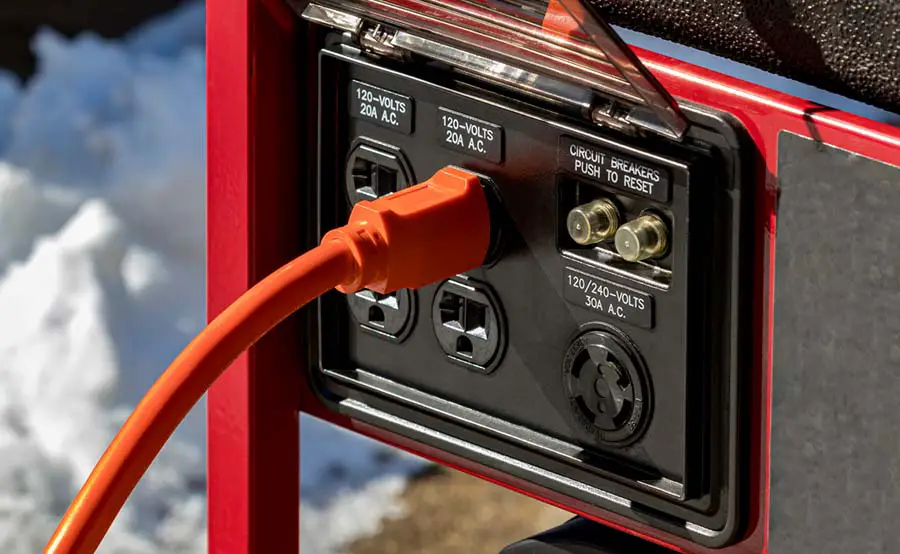
When you start needing a generator, the signs will be there, you may find your PC shutting off at an inopportune time, your showers might have turned cold, or worryingly the frozen food has started crawling out the fridge on their own. Choosing a good generator is a challenge, understanding how they create power is one of the biggest things that will affect your decision. This is why it is essential to understand where generators get their energy.
Mechanical generators use an internal combustion engine with an alternator to turn the motor’s movement into electricity. Solar and inverter generators convert DC power to AC, usually collected from the sun and stored in batteries. All generators use inverters to convert energy into usable power.
You will need to understand the many types of generators and how each produces power to comprehend how the technology has improved over time. Even generators that use the same kind of fuel can have vastly different levels of efficiency, with many people not aware of how this changes what you can do with a generator. Knowing how the generators work, how they create power, and what effect they have on the systems in your home is vital.
Where Do Generators Get Their Energy?
Where a generator first gets its power is crucial because the unit’s eco-friendliness is entirely dependent on it. Each type of generator has its way of creating initial energy by using either the sun, heat, or combustion to make energy that it can convert into usable power. It may sound simple, but diesel and gas generators all have slightly different, which makes them all varying levels of efficiency.
To choose the best generator for whatever you may need, you will need to understand how these work, how each system can be affected by their initial energy production, and what must happen for the generator to create energy effectively.
Usually, people that live in larger homes will need to do the most research, as smaller apartments use a lot less energy. Naturally, it’s essential to note that offices and large homes always require the most power and present the most challenging problem.
Gas Generators
Gas generators are the easiest to understand and will be the ones that are most commonly available. These generators rely entirely on the same principles that make your car move. The internal combustion of the engine drives mechanical parts and turns a shaft. Attached to this spinning shaft is an alternator consisting of magnets and copper wires that produce DC electricity.
Gas generators are the easiest to operate and will be perfectly fine if you need electricity to be produced for a few hours now and then. If you live somewhere where power rarely fails, these generators cannot run for days on end but can produce more than enough power to keep the light on and fridge running for a few hours.
All in all, ensure that you buy a generator that pushes out enough wattage for your home and energy needs.
Diesel Generators
Possibly the most misunderstood generators are diesel generators because many people think they simply work the same way as gas generators. However, there is one slight difference that makes diesel generators more fitting for larger tasks. Because diesel engines work using low heat production, highly efficient burns, and a lower need for fresh air, they can run for several days without shutting down.
Diesel generators can be just as small as a gas generator; however, they are usually quite large, meant for large homes, estates, or offices that need several thousand kWh each day. Diesel generators are some of the largest generators globally and some of the smallest, capable of producing enough energy to power entire small countries if needed. However, apart from the engine and fuel system used, they are built the same way as a gas generator.
Solar Generators
These are the solar panels that you can see many homes worldwide equipping as the movement for renewable energy becomes more and more critical. The source of this energy is the sun, which is the most significant source of power in the solar system.
There are several types of solar panels, each one producing electricity in slightly different ways. The most common solar panels that you will be able to purchase for your home will absorb the sun’s energy with photovoltaic cells.
Sunlight contains photons that pass through the solar panel, and the panel absorbs these creating a current of electricity through a complex series of reactions. It is not necessarily that more heat equals more power, but instead, it’s more about the direct line of sight and length that the sun shines that produces the energy.
The solar panels store the power they produce in batteries, and then it is converted to AC power using an inverter.
Inverter Generator
Inverters are on every type of generator because AC can travel long distances while losing little energy, but it can be challenging to produce at home. While DC power is easy to create, very few modern appliances use DC because of its danger when someone is shocked. Inverters are complex pieces of circuitry that use transformers to make AC out of DC.
You can purchase inverters separate from generators, though, which you need if you are using solar panels. Therefore, all you need to create electricity is access to a large and robust battery, where cars and trucks come into play. Many people that need quick and easy access to 120V AC, but only for relatively short periods, will hook up inverters to their car batteries.
What Power Source Does an Emergency Generator Use?

So far, we have been talking about generators that you will need to start manually or that will already be providing some electricity to your home. These are all perfectly fine if you only have a small office or you need only enough power to get the kids to bed. However, there is a different kind of generator called the emergency backup generator that few people fully comprehend.
These systems can be larger than two trucks parked next to each other, weighing several tons, needing separate areas of an office complex to run effectively. Emergency backup generators are some of the largest generators that you may find in a city. They are often diesel generators designed to kick on when there is a power interruption instantly. Some larger systems have complex battery systems built in to create uninterruptible power systems as well.
An emergency generator will use the same combustion engine system that your generator at home will use. However, these engines are significantly larger, with only a few vehicles on land compared in size. The largest of these generator systems have motors that are usually standard for large cruise liner ships. The most well-known international producer of these engines is the American company Cummins, which produces several of the largest engines in the world.
How Do You Decide Which Generator Type is Best for You?
Deciding which generator you should choose can be challenging, especially if you want to stick to something more straightforward for your home. People often buy extremely overpowered generators when they only need to keep the lights on when the power fails. You need to check on many things before making the purchase, especially if you are planning on spending more on a generator system for your home.
Each type of generator produces power differently, which means that each requires different kinds of maintenance, produces different power levels, and can run for varying lengths of time. You will need to know what to look out for and how to decide which system will work best for your home in the long run.
- Power: This is the first thing you will need to decide on, how much power does your home need to keep running when the power does fail. It is highly advised that you reduce the total amount of power that you use during power interruptions. However, if you have a home office, or looking for a generator for an office, you will need to get something that can run for longer and produce more power.
- Regularity: Power systems are usually quite reliable, which means that you will not need something super fancy or large to provide power to your home if the only power interruptions you experience happen once every 5 years. However, if you are running a business or live somewhere with regular power outages you should look into getting something that can easily be serviced and repaired.
- Size of the home: A small home or apartment may not need a generator larger than a few hundred watts, as you can usually shut the fridge, geyser, and PC off when the power does fail. If you have a large office, home, or shared living space then it would be best to have something that can handle everything you may need.
- Longevity: A solar power system that has been scaled properly can run for several days, while a gas generator can only be run for a few hours before overheating. Diesel generators can run as long as there is diesel provided, while inverters will rely heavily on the power supplied by the battery. Only you will be able to know how long the generator system will need to provide power to your home.
- Replacement: This is where solar panel systems usually fail, as they can easily be replaced but most components can cost hundreds of dollars. While generators that rely on fuel can easily be repaired, many times you can find similar replacement parts at an auto parts store. Most fuel generators if maintained properly may not even need replacement parts for as long as you have the generator.
- Maintenance: While it can be expensive to replace solar panel parts, it usually requires little to no maintenance to keep going. The only parts that can fail with age are the batteries, and as the technology improves it has become less and less of a problem. Fuel-reliant generators can need monthly fixes, especially as they age, which will take your time and money to do properly. If you want a hassle-free system going solar might be the better option as after initial installation all you’ll need to do is wash off the panels every few months.
- Complexity: Internally all power generation systems will be rather complex, however, hooking them up to your home may be simple. Fuel generators can be as simple as plugging into a wall and the right socket of the generator and flicking a few switches. Solar panels on the other hand need to be balanced, connected and tested to ensure that the power is going to the right place and that everything is working as needed.
- Automation: Possibly the best thing about solar backup systems is that you may not even notice that the power for your home has been deactivated. Modern systems will simply switch over to the backup batteries, sending you a notification to let you know the power is off. Most fuel-based systems will require that you do a few manual switchovers, starting the generator and flipping switches. The only exceptions being large, automated emergency backup generator systems.
Which Type of Generator Produces the Most Energy?

One of the best questions is which generators can produce the most electricity, as times constantly change and generators continually improve. However, as most cruise ships rely heavily on the power from their engines to create power, diesel generators still produce the most electricity.
This is because diesel generators come in varying sizes, with some that can fit in the back of a hatchback, while others are large enough to hold several hatchbacks in them.
For your home, most fuel generators will always be able to produce the most electricity, especially where cost is concerned. These generators can produce several thousand kilowatts without properly ramping up, with most people never using the full strength of their generators. If you plan to run a business from your home, it would be wise to get a large generator.
However, it becomes a lot more interesting when looking at solar panels and how they relate to businesses. As the technology has matured into something more than a gimmick, many large companies are actively installing solar panel arrays that can power their offices and then push back several kilowatts each month to the local power grid.
Which Type of Generator is the Most Efficient?
There are several ways to look at which system will be the most efficient. The obvious and easy answer is solar power because it requires no active input from the homeowner or business to run. However, while solar would always be the best answer in a perfect world, unfortunately, you must consider location, time, and speed.
We will take a look at the most efficient system for large homeowners, for people looking to lower their monthly power bill, for emergencies, and those just looking for backup power. You must consider each instance with the owners of the systems having to be aware that just because something is the most expensive does not mean that it will be the best for their situation.
Generator for Large Houses
Large houses have the fortunate side effect of being on larger properties or just having larger areas exposed to the sun. This means that there may be a large plot of land or a large roof that is entirely unused. Which naturally makes a full solar power array the best thing to use, as it means no unused space and that you will have a silent way of producing power.
If you have a normal-sized house or an apartment with a balcony, the answer for the most efficient generator will always be a standard generator. Not only will it take up the least amount of space, but it will also produce the right amount of power. However, it’s important to note that all internal combustion engines are only about 45% efficient at their peak. Most of the energy is lost to heat instead of turning into usable energy.
Generators for Low Energy Bills
Surprisingly, this is the main reason many people in well-developed countries look into generators and their potential. Unfortunately, no diesel or gas-powered generator will offer any value or efficiency above the power produced by the government entities. The cost of fuel and maintenance quickly overwhelms any gains you may have made on the amount of energy created.
The only system that can be efficient to lower the monthly cost of electricity is a solar panel system. We recommend installing these in stages if you have a building that already operates. Many companies have started looking into using a solar panel from the get-go precisely because of the large amount of monetary savings. Solar panels can typically make the cost of their installation back within 2 to 3 years for a normal-sized office building.
Generators for Emergencies
The most efficient power system for emergencies will always be the one already installed. These can be anything from a weak solar system, three generators that you are trying to run all at once, or just the old generator you bought at a salvage store. When you are in an emergency, there is no real way to measure the efficiency of the solution that you have made.
However, it’s important to note that if you have the time and the emergency is only a one-time thing, buying a fuel-powered generator will often be the best option. You can decommission it to be stored away until the next emergency requires it, or you can sell it and sometimes even make a small profit. Emergencies are not times when you should be stressing about which power-producing system will be the most efficient.
Generators for Backup Power
These are the system that will be in large skyscrapers, hospitals, government buildings, or at your well-prepared house. The most efficient one will always be large diesel generators, as these can be left for months on end with you changing out the oil and diesel as the system ages. This means that it is a once-off buy that requires little to no maintenance to power the entire building without fail for days.
While solar power systems can be significantly more efficient, they would not be cost-effective if you live in a country with great eco-energy production or little to no power interruptions. Further, solar power systems are usually designed and built to be entirely off-grid, and while powering a home can only require a small space. When looking at powering entire office buildings, the amount of space taken by the solar panels may not be at all worth it.
How Can You Make a Generator Produce More Power?
If you have chosen to use a fuel generator, you may wonder if it is possible to improve its power production abilities. Many times, mechanics will actively want to strip these generators to look at what is happening inside of them. Usually, this can cause issues as the fundamental part that produces the power is the alternator, not the engine.
While you can make the engine run better, you generally cannot create more power by making the machine work faster. These engines optimize to their utmost best to what they can produce with the alternator attached to them. This is why it may sound great in theory to add a better fuel, a turbo, or anything else that you would do to make a car more efficient, but it would ultimately be a waste of time and money.
However, if you notice that your generator is not producing the right amount of power, you can do a few things. First, locate the throttle and open it up to increase the speed at which the engine is turning and will have the alternator producing power at its maximum. The second and more common thing you should do is give the entire generator a service, especially if it is making funny noises or speeding up and slowing down even when nothing is drawing power.
Conclusion
Generators all produce power from more or less the same place, with only inverters and solar systems being the exception. The conversion of mechanical energy to electrical energy has always been how humans produce power, even with the best nuclear reactors in the world working on the same principle.
Whatever you do, please don’t think that a generator can run without fuel. Nothing makes you feel so silly as when you try and troubleshoot the generator only for the tank to be empty!

